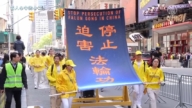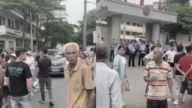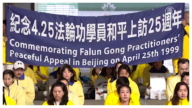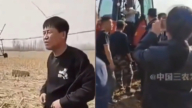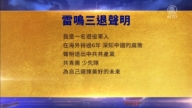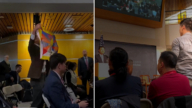【新唐人2011年8月20日訊】大陸鐵道部發言人王勇平,因為在「7.23」動車追尾事故處理中發言不當,最近被當局免職。這一事件引來各界熱烈的議論,也使媒體再度聚焦中共新聞發言人這一職業,並提出質疑說:這些政府發言人到底怎麼了?中共到底需要甚麼樣的發言人?
根據大陸官方消息,鐵道部新聞發言人、政治部宣傳部長王勇平被停職,將遠赴波蘭華沙,擔任鐵路合作組織的中方委員。在此之前,「7.23」動車追尾事故的新聞發佈會上,王勇平回答記者有關當局的處理結果時,官味十足的說:「至於你信不信,我反正信了。」由此引發眾怒。
《美國之音》報導指出,像王勇平這樣的不當言論,在中共官員中是普遍現象,文章質疑:這些發言人到底怎麼了?
中共黨史學者林保華對《新唐人》表示,發言人實際上是中共的代言人,不能有自己獨立的思想,都是按照政府和上級的指示說話。
林保華:「他也是為了鐵道部的利益,來講這些話,只是說,現在的民眾不像以前那個樣子,隨便給你騙了。所以呢,他按照老一套來這樣發言的話呢,結果就等於撞板了,就等於碰了釘子了。」
面對批評,王勇平曾經為自己辯解說:他做了政府需要他做的,他「問心無愧」。
郝曉明教授:「你作為一個發言人的話,你應該是站在一個公眾的角度來看這個問題,站在一個媒體的角度來看這個問題。然後這樣,你所回答的問題,你會想一個比較全面的範圍來去考慮這個問題。不是簡單的說,我代表政府,向你們怎麼說,向你們怎麼解釋。」
2003年,大陸當局隱瞞非典疫情,讓全世界嘩然。為了減輕壓力,當局開始大規模設立新聞發言人,並在2003年舉辦了首期新聞發言人培訓班,王勇平就是其中的一位。
但是,隨著中共政府公信力的日益喪失、民眾維權意識的逐漸加強,這些在夾縫中生存的發言人面臨著越來越尷尬的局面。
高瑜:「發言人制度呢,原來是一種,打算做出一種開放的姿態,過去很少有發言人,除了對外國記者,外交部,現在各個政府部門,好像是要對人們和媒體溝通,對輿論開放,實際上,這個事件呢說明,(中共)在宣傳上也是非常失敗的。」
不單是王勇平,在近期廣受關注的「故宮哥窯事件」、「郭美美事件」中,新聞發言人的表現也無法讓公眾滿意。不久前,中央黨史研究室副主任李忠傑在新聞發佈會上大打太極,搞得記者不知所云,也受到媒體的批評。
對於新聞發言人的極度「樣板化」,有人形象的把他們概括為:「無可奉告型」、「照本宣科型」、「自我辯護型」、「惱羞成怒型」、「感情錯位型」、「報喜不報憂型」。中共前外交部長李肇星也曾經坦承:新聞發言人不是「人」。
今年(2011年)5月份,河南大學宣佈設立全國第一個「新聞發言人」專業,這一舉措招來很大爭議。有知名媒體人指出,這是「誤人子弟」;網民則大膽直言:「說簡單一點,(大陸)新聞發言人專業就是騙子專業,教你怎麼說假話,怎麼騙人。」
新唐人記者常春、李謙、李若琳採訪報導。
What Should China』s Spokesman Do?
Ministry of Railways spokesman Wang Yongping,
was dismissed recently by the Chinese authorities,
for his inappropriate comments regarding the recent
7.23 rear-end high-speed train crash.
This led to hot debates in all walks of life.
Media also focus on the occupation of spokesmen in China.
They questioned what was wrong with these spokesmen,
and what kind of spokesmen is needed by the authorities.
According to official news in mainland China, Wang Yongping,
Ministry of Railways spokesman and director of political
propaganda department was suspended, and will go to
Poland, as a representative of a Chinese railway company.
Previously, on a press release about the recent high-speed
train accident, in response to a reporter』s question
about how the Chinese authorities handled the accident,
Wang said arrogantly, “No matter you believe it or not,
I believed it, anyway." This has infuriated the people.
Voice of America』s report pointed out that
such inappropriate remarks are very common in China.
The article questions: what』s wrong with these spokesmen?
Lin Baohua, scholar of the Chinese Communist Party』s (CCP)
history told NTD the spokesmen actually speak for the CCP;
they cannot have their own independent thoughts.
They just speak on orders of the officials and government.
Lin Baohua: “He spoke for the interests of the Ministry of
Railways. But now people cannot be deceived as before.
So if the spokesman spoke in the same old manner,
then he would end up in trouble."
Facing criticism, Wang defended himself that he did what the
government needed him to do, and he “didn』t feel guilty."
Professor Hao Xiaoming: “As a spokesperson, you should
speak from a public point of view, the media』s point of view.
Then you will consider this issue more comprehensively.
It is not simply to say, I represent the government,
and speak to you, and explain it to you."
In 2003, the Chinese authorities concealed SARS epidemic,
which shocked the whole world.
In order to relieve the pressure, the authorities began to
hire spokesmen in large quantity.
They held the first training session for spokesmen in 2003.
Wang Yongping was one of them.
However, with the diminishing credibility of the government,
the people gradually become aware of their rights.
Spokesmen who survive in the gap between the government
and the people face an increasingly embarrassing situation.
Media professional Gao Yu: “The spokesman system was
set up to show an open attitude.
In the past, there were very few spokesmen,
who were only in the Foreign Affairs department.
Now various government departments seem to communicate
with people and the media, and be open to the public.
This event shows that (the CCP』s) propaganda is a failure."
Besides Wang, other the spokesmen performed
unsatisfactorily in the recent cases, such as
the 『Forbidden City Geyao Case』 and 『Guo Meimei scandal』.
Not long ago, Li Zhongjie, deputy director of the Central Party
History Research Center made rounds at a press conference,
reporters did not understand what he was talking about,
which also drew media criticism.
Some classified the spokesmen into different types: such as
『no comment type』, 『scripted type』, 『self-defense-type』,
『angry-type』, 『feelings dislocation type』,
and 『reporting only good news type』.
Li Zhaoxing, former spokesman of Ministry of Foreign Affairs
admitted that spokesmen are not 『human beings』.
In May 2011, Henan University announced to establish a
program to train spokesmen, which will be the first in China.
The move attracted much controversy.
Some well-known media professionals said it would be
a harmful education to the students.
Some netizens said, “The spokesman program is for liars.
It teaches you how to lie and to deceive others."
NTD reporters Chang Chun, Li Qian and Li Ruolin



